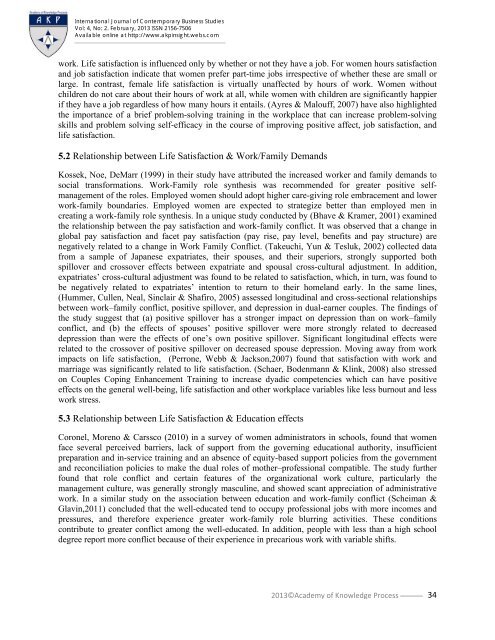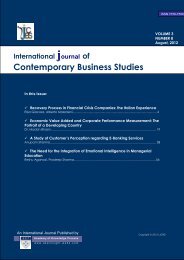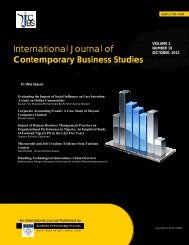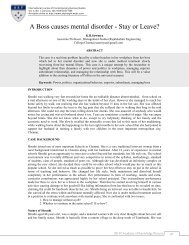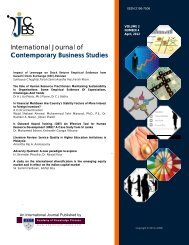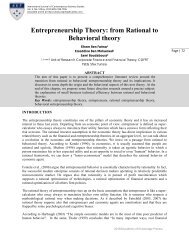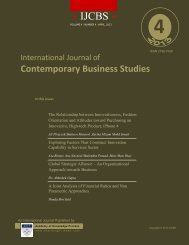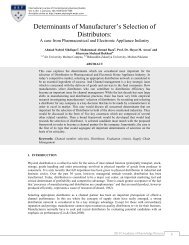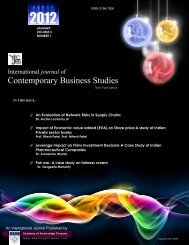Contemporary Business Studies - Academy of Knowledge Process ...
Contemporary Business Studies - Academy of Knowledge Process ...
Contemporary Business Studies - Academy of Knowledge Process ...
You also want an ePaper? Increase the reach of your titles
YUMPU automatically turns print PDFs into web optimized ePapers that Google loves.
International Journal <strong>of</strong> <strong>Contemporary</strong> <strong>Business</strong> <strong>Studies</strong>Vol: 4, No: 2. February, 2013 ISSN 2156-7506Available online at http://www.akpinsight.webs.comwork. Life satisfaction is influenced only by whether or not they have a job. For women hours satisfactionand job satisfaction indicate that women prefer part-time jobs irrespective <strong>of</strong> whether these are small orlarge. In contrast, female life satisfaction is virtually unaffected by hours <strong>of</strong> work. Women withoutchildren do not care about their hours <strong>of</strong> work at all, while women with children are significantly happierif they have a job regardless <strong>of</strong> how many hours it entails. (Ayres & Malouff, 2007) have also highlightedthe importance <strong>of</strong> a brief problem-solving training in the workplace that can increase problem-solvingskills and problem solving self-efficacy in the course <strong>of</strong> improving positive affect, job satisfaction, andlife satisfaction.5.2 Relationship between Life Satisfaction & Work/Family DemandsKossek, Noe, DeMarr (1999) in their study have attributed the increased worker and family demands tosocial transformations. Work-Family role synthesis was recommended for greater positive selfmanagement<strong>of</strong> the roles. Employed women should adopt higher care-giving role embracement and lowerwork-family boundaries. Employed women are expected to strategize better than employed men increating a work-family role synthesis. In a unique study conducted by (Bhave & Kramer, 2001) examinedthe relationship between the pay satisfaction and work-family conflict. It was observed that a change inglobal pay satisfaction and facet pay satisfaction (pay rise, pay level, benefits and pay structure) arenegatively related to a change in Work Family Conflict. (Takeuchi, Yun & Tesluk, 2002) collected datafrom a sample <strong>of</strong> Japanese expatriates, their spouses, and their superiors, strongly supported bothspillover and crossover effects between expatriate and spousal cross-cultural adjustment. In addition,expatriates’ cross-cultural adjustment was found to be related to satisfaction, which, in turn, was found tobe negatively related to expatriates’ intention to return to their homeland early. In the same lines,(Hummer, Cullen, Neal, Sinclair & Shafiro, 2005) assessed longitudinal and cross-sectional relationshipsbetween work–family conflict, positive spillover, and depression in dual-earner couples. The findings <strong>of</strong>the study suggest that (a) positive spillover has a stronger impact on depression than on work–familyconflict, and (b) the effects <strong>of</strong> spouses’ positive spillover were more strongly related to decreaseddepression than were the effects <strong>of</strong> one’s own positive spillover. Significant longitudinal effects wererelated to the crossover <strong>of</strong> positive spillover on decreased spouse depression. Moving away from workimpacts on life satisfaction, (Perrone, Webb & Jackson,2007) found that satisfaction with work andmarriage was significantly related to life satisfaction. (Schaer, Bodenmann & Klink, 2008) also stressedon Couples Coping Enhancement Training to increase dyadic competencies which can have positiveeffects on the general well-being, life satisfaction and other workplace variables like less burnout and lesswork stress.5.3 Relationship between Life Satisfaction & Education effectsCoronel, Moreno & Carssco (2010) in a survey <strong>of</strong> women administrators in schools, found that womenface several perceived barriers, lack <strong>of</strong> support from the governing educational authority, insufficientpreparation and in-service training and an absence <strong>of</strong> equity-based support policies from the governmentand reconciliation policies to make the dual roles <strong>of</strong> mother–pr<strong>of</strong>essional compatible. The study furtherfound that role conflict and certain features <strong>of</strong> the organizational work culture, particularly themanagement culture, was generally strongly masculine, and showed scant appreciation <strong>of</strong> administrativework. In a similar study on the association between education and work-family conflict (Scheiman &Glavin,2011) concluded that the well-educated tend to occupy pr<strong>of</strong>essional jobs with more incomes andpressures, and therefore experience greater work-family role blurring activities. These conditionscontribute to greater conflict among the well-educated. In addition, people with less than a high schooldegree report more conflict because <strong>of</strong> their experience in precarious work with variable shifts.2013©<strong>Academy</strong> <strong>of</strong> <strong>Knowledge</strong> <strong>Process</strong>34


